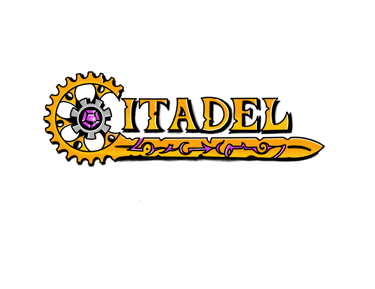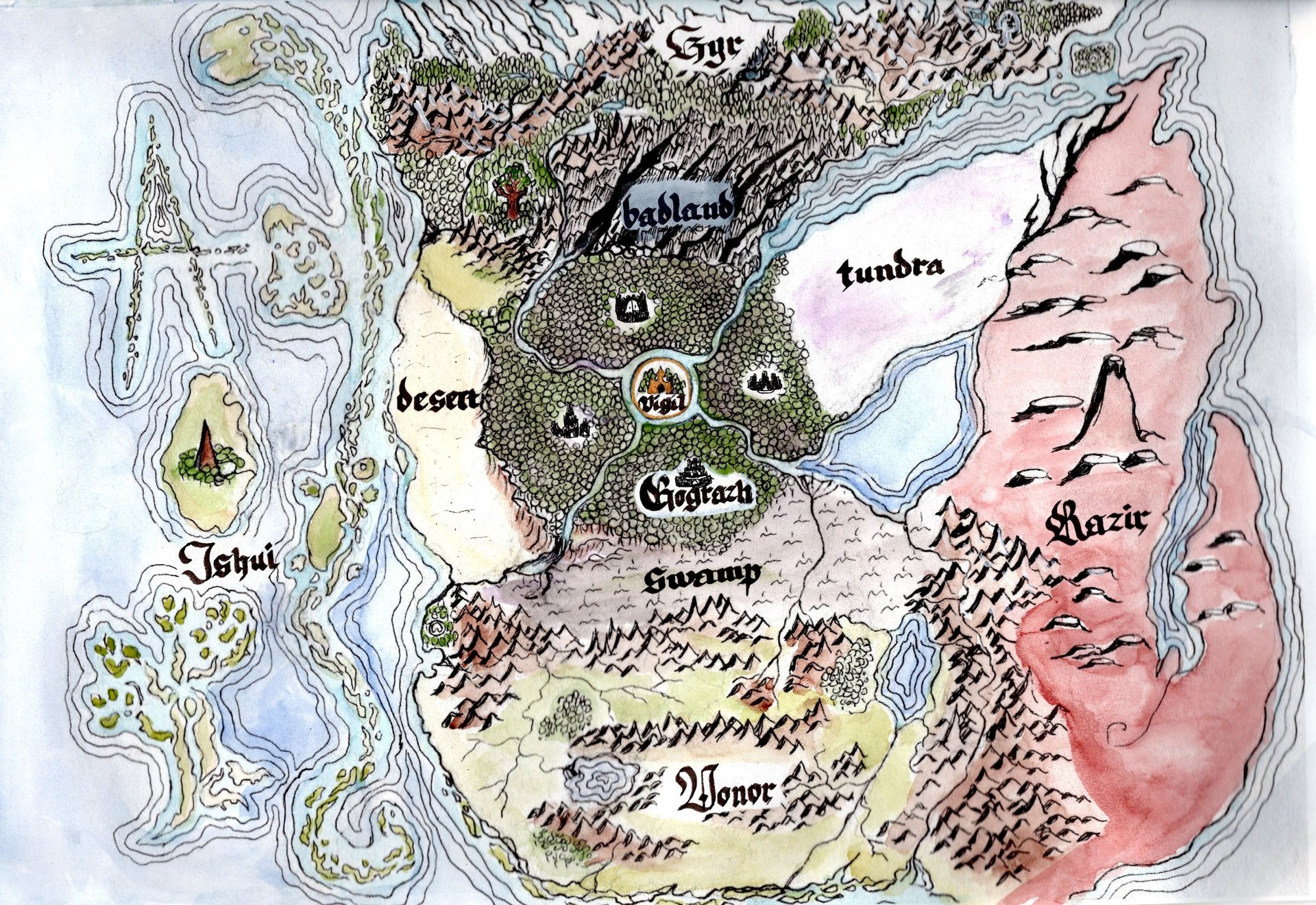
Technology & Economy

The current age of Tokavah has seen an unprecedented growth in trade and technology.
In real-world terms, the setting resembles a fantastical Bronze Age with clockwork Artificing and magic.


Technology
Magic and technology have always been inexorably linked in the world of Tokavah. Many Artificed items use kalzokash as a power source and the prevalence of magic among the population means that it is as much a fact of life as any mundane tool. The last fifty years has seen a huge boom in Arcanatech advances, culminating in the recent creation of the sparktech pistol and musket.
Mundane (non-magical) technology that fits the setting includes anything appropriate to the real world Bronze Age. Additionally, Citadel incorporates "clockpunk", a subgenre of "steampunk". Rather than a retro-futuristic world where technology is based on steam power, clockpunk is technology based on clockwork mechanisms - cogs, gears, and Da Vincian machinery. Because of the strong influence of magic in the setting, most Artificed items are designed as a mixture of clockwork and kalzokash crystals. If you are unsure what would fit the setting, check out the Artificer production list (Public Production List) or contact Citadel staff. You can also join the Discord and chat with players and staff directly about the setting.
Some real-world setting comparisons to Citadel include Legend of Zelda: Breath of the Wild, Legend of Zelda: Tears of the Kingdom, and the Arcane Netflix series.


Economy
Before the Gloaming Years (the current age), the nations of Tokavah did very little trade with one another. Now, however, with the establishment of the Circuit Road, the nations have enjoyed an unprecedented level of interaction. The road is still long and dangerous, so it is unusual for the average person to travel frequently. The big exception to this, of course, are the Mendicant Orani, who spend their entire lives traveling around the Circuit Road. It is through the Mendicants, and the diligent work of the Wardens of the Endless Road and Braided Band, that international trade has flourished. See the specific nation pages for more information on their common trade items.
Money
The people of Tokavah use a standardized coinage with mints in both Kyr and Vonor. Copper coins are minted at both locations; silver coins are minted in Kyr and gold coins are minted in Vonor.
Copper coins are the lowest denomination of coin. They are officially called "marks", but nicknames such as "coppers", "rounds", and "mazes" are commonly used.
Silver coins are the next denomination of coin. They are officially called "kennings". Some nicknames include "silvers", "maidens", and "kays".
Gold coins are the highest denomination of coin. They are officially called "strava". Some nicknames include "golds", "sheaf/sheaves" and "vees".
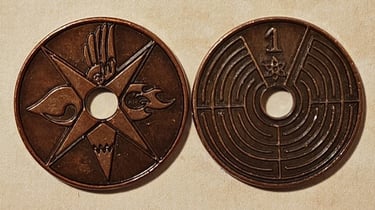

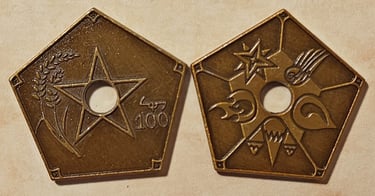

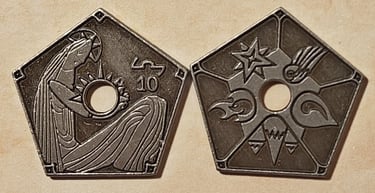


Earning Money
Just like in the real world, people in Tokavah earn a living in a variety of ways. Characters may include any setting appropriate profession in their backstory. If you aren't sure if a specific job would be appropriate, please contact Citadel staff to discuss it.
Between adventures (meaning between Citadel events), characters are assumed to support themselves in whatever way makes sense for them. Any income "earned" during that time is only for narrative purposes and would not be incorporated into the game. However, there are a number of ways that characters can earn money between and during adventures.
As a Between Game Action, characters may chose to earn money which they would receive at the start of their next event. See the Post Event Forms page for more information about BGAs. Characters with the Craft skill earn one (1) silver kenning at the start of every event. Gardeners (and Physickers with the Botanist skill) may receive a tag for every plant in their garden at the start of every event.
One reason an adventurer may choose to go into dangerous places in the first place is to find treasure. There may be materials that can be harvested, hidden treasure troves, or other loot to find. Characters with the Antiquities Appraisal skill are always on the look out for antiquities that could be sold to an interested buyer. Additionally, during an event, there will be a centrally located Notice Board. This Notice Board will contain information about specific jobs or tasks that characters can perform in order to earn some money.
Characters with Trade Skills may craft production items using their Production Points. They might use those items for themselves or give them away, but sometimes characters can sell their extra goods to other player characters or to NPCs.

Production Materials
Some of the most important items available for trade are the production materials for the Trade Skills. Characters use Production Material Units (or MUs) to craft production items.

Metal Material Units
Unsurprisingly, the primary Material Unit (MU) used by Artificing is metal ore. Scribes (Inscription) occasionally use metal as a special component in the creation of spellscrolls. Physickers rarely need it, but Alchemists frequently work with metal.
There are six (6) different metals used as production materials: Iron, Obsidian, Copper, Silver, Gold, and Tavrashil.
Iron ore is the base metal MU. One (1) Iron ore equals two (2) MU. It can be used directly for the MU requirements of an Artificing or Arcanatech item's creation. The other five ores can either be sold for coin or are required components for specific production items.
For example, the Artificing item springplate rapid trap requires four (4) MU to craft, but also has one (1) copper ore as a required component. That means an Artificer would need to expend two (2) iron ore (or pay the current market price for them) in addition to one (1) copper ore when creating the springplate rapid trap.
While adventuring, characters may encounter ore that can be harvested. Characters with proficiency with a blunt weapon may harvest ore from one of those nodes on a ten count.
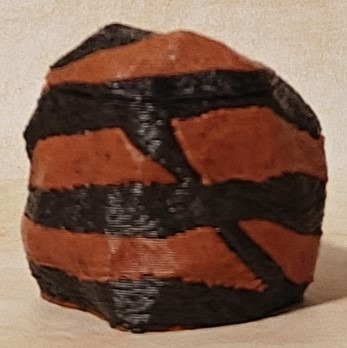

Iron ore
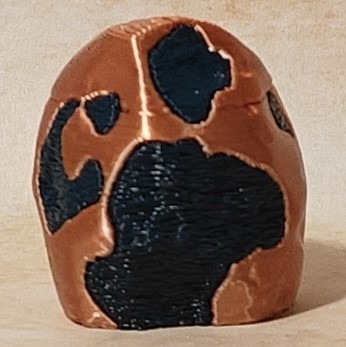

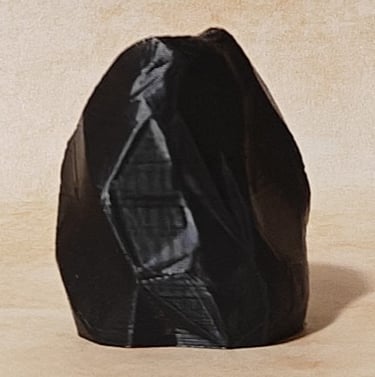

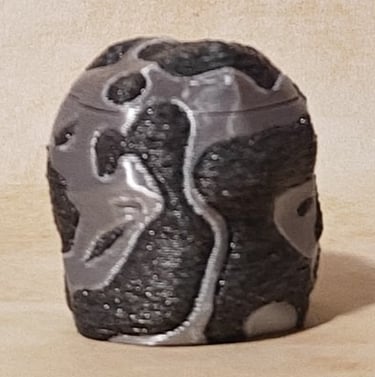

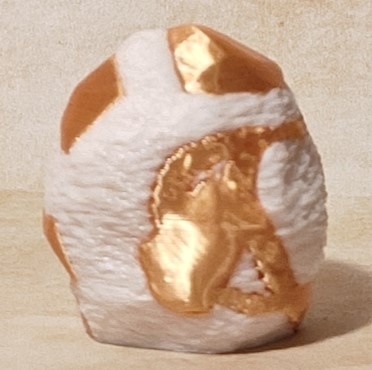

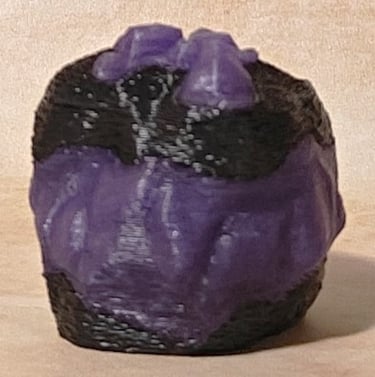

Copper ore
Obsidian ore
Silver ore
Gold ore
Tavrashil ore

Plant Material Units
Physickers, Alchemists, and Scribes use plants as their primary production material. Plants are rarely, if ever, used in Artificing or Arcanatech.
There are many different Common plants used as production materials as well as a few Rare plants used as specific required components. See the Plants of Tokavah document for more details.
All Common plants in Citadel are represented by a general assortment of fake flora. The phys-reps are merely to identify a plant that can be harvested, not the In-Game appearance of a specific plant.
All Rare plants in Citadel are represented by a general assortment of purple fake flora. As with the Common phys-reps, the color and appearance is merely a way to identify that it is a harvestable, Rare plant.
Each phys-rep will have an attached envelope containing one (1) or more tags. When harvesting a plant, the player should take one (1) tag only. If more tags are in the envelope, other individuals may also harvest one tag from that plant.
A Common plant tag equals one (1) MU for Physicker Studies, Alchemy, Inscription, and Sigilcraft. Each plant is separated into one of the following categories: Augmentation, Healing, Poison, and Utility. If a Physicker production item category matches the category of the Common plant, then that Common plant counts as two (2) MUs during the creation of that item.
For example, an Accelerate Healing ingested potion, which is in the Healing category, requires two (2) MU to craft. A Physicker could expend two (2) Quillleaf plants (a Common plant within the Augmentation category) or just one (1) Torha's Root plant (a Common plant within the Healing category). As always, a crafter can choose to spend coin at the current market rate rather than expend actual material items.
Characters with proficiency with a hafted weapon may harvest a plant on a ten count.
Other Uses
Common Plants may have other uses beyond just acting as Material Units. Any player interested in discovering these more obscure uses should keep a Botany Journal. When a player believes they have discovered a new use for a Common Plant, they should write it in their Botany Journal and have a staff member sign it to confirm it is correct.







Creature Material Units
There are two different production materials that can be harvested from a dead creature: Humors and Bones. Humors represent a liquid sample that contains the creature's Essence. Both one (1) Humor vial and one (1) Bone piece are equal to one (1) MU.
Physickers and Scribes can both use Humors as MUs for their production items. Artificers can use Bones as MUs for their production items.
Characters with proficiency with a bladed weapon may harvest from a creature.
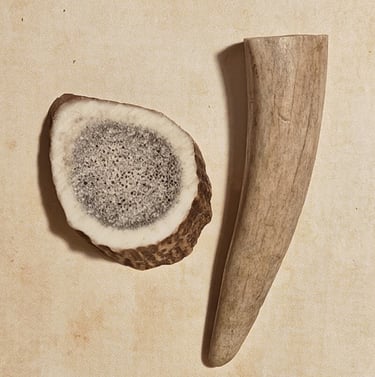

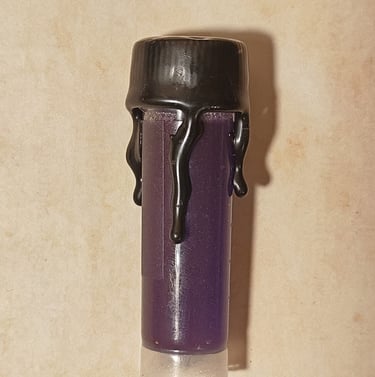


Magical Material Units
Although not used for standard material units, kalzokash are often required components for all of the Trade Skills. Arcanatech, Alchemy, and Glyphcraft, in particular, use them frequently.
You can learn more about kalzokash on the Magic of Tokavah page, Materials of Magic section.
